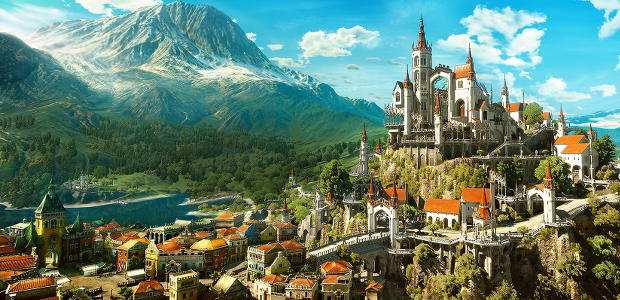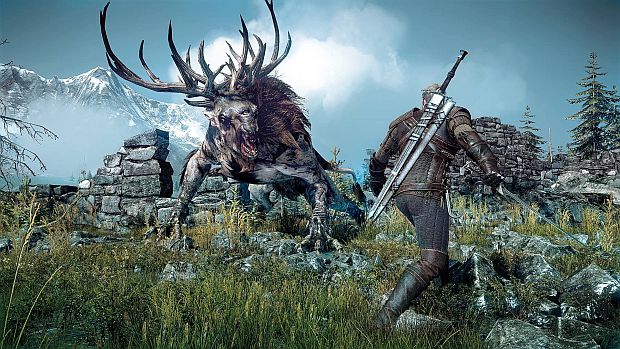The Witcher 3 Is A Folklore RPG, Not A Fantasy RPG
Faith and Folk
The Witcher 3 is a wonderful game in a very literal sense. It is full of wonder, from the startling entities that stalk its darkest corners to the stories that echo through the ages, and even the alternately bleak and brilliant weather, which I enjoy on an almost metatextual level, appreciating the techniques that paint storms and rainfall onto the world. I could spend hours just watching the skybox transform. It's also grounded in reality of a sort though and shot through with an understanding of folklore, superstition and historic belief systems.
I don't know much of the surface I've scratched but I'm nowhere near ready to tackle either of the expansions yet, partly because I spend so much time exploring every inch of every area. If someone were to describe The Witcher 3 to you, or even if you'd followed news and articles about it before and after release without actually playing it, you might think it was a game about magic and monsters, or incredible landscapes and enormous cities.
Well, it is all of those things. It's also a game about romance and horror, and a Very Serious Gruff-Voiced Man who chases goats and sighs as he rings a tiny little bell. The sheer scale of the game allows it contain many things and to be many things, but from my perspective, the most unsung aspect of the game is the way in which it treats ordinary people. The peasants and the merchants and the blacksmiths and the herbalists and the guards and the ruffians and the children.
The Witcher 3 belongs to them as much as it does to Geralt, and in creating this vast wartorn world, CD Projekt Red have demonstrated a skill that is incredibly rare in RPG development; they show as much care and attention for their minor characters as for their major characters. Often, RPGs take on the qualities of a saga, focusing on the giants of their time and caring little for the people who don't measure up – if you can't lift Mjölnir or a close equivalent, you're barely worth any screentime at all.
The Wild Hunt takes place in a world where the extraordinary is paradoxically commonplace, as is true in almost every fantasy setting, but it differentiates itself by constantly acknowledging the commonplace nature of the fantastic, and it does so by having the ordinary folk comment upon it. It's a series of folktales rather than a fantasy epic, and that's not just in the writing of the excellent bestiary entries or the many books you can find, or even in the composition of the contracts and quests. It's in the lives of the people who make the world tick.
Given my love of NPC schedules, it'd be reasonable to expect my love of The Witcher 3's folk to be tied into their mechanical behaviours, but that's not the case at all. It's their words that I love and the way in which CD Projekt Red have attempted to understand and reinterpret a version of the medieval mind.
You know that L P Hartley quote (and you most likely do know it even if you don't know Hartley), “The past is a foreign country; they do things differently there”? The Witcher 3 may not be set in a specific time in our own world's past but it draws on many aspects of European history and its writers and designers have effectively created a game with its own language. It is a foreign country and people do things differently, speak differently, and live differently. Even, and perhaps especially, the ordinary people.
This manifests itself in every facet of the game. Herbalism is understood by most but only practiced by a few, and more spectacular feats of 'magic', such as teleportation and transformation, are understood either as curses, blessings (elements of faith) or technological conceits of a sort. A mage leaves messages for those who seek him and they're essentially Leia's hologram playing on repeat, and acknowledged as such by one of the characters in the game, using a technology of her time, explaining the trick as something like “the mage's version of a postbox”.
The Wild Hunt are seeking their prey in a world that is familiar with the supernatural but it's a world that approaches the unknown with a sense of pragmatism. “What could this mean? What might it symbolise? How might we prevent it or turn it to our favour?” Those three question alone are a gross oversimplification but they show a certain logical method of dealing with the unfamiliar. The important thing, first of all, is to weave anything new into an existing structure of beliefs, to make it part of a wider set of knowledge so that it can inform and be informed by its neighbours. Mythological taxonomy, of a sort.
Somebody got eaten by a Water Hag? Probably something to do with his lovelife, or his tendency for late night drunken rambles. Most likely both, in combination. And if a witcher were to come along and sigh, and explain that, no, it's not really about that, and then sit down with an open fire and some oil to smear on his blade, and some herbs to mash into a bottle, who could blame people for smirking? Strong, he might be, and effective, sure, but his ideas about the world are a little odd.
Geralt, flaws and virtues alike, is a spark of the modern, attempting to hold back tides of horrors but also occasionally lamenting that, in doing so, he may be eliminating so much that is interesting in the world. His outsider role has him act as an often unwilling author of the future of individuals, species and ways of life. Rather than being the person with the highest lore stat, capable of interpreting the world's folklore in a more intricate fashion, Geralt's scientific approach to the troubles of the world marks him as 'other', a character plucked from a different system of knowledge entirely.
But even his system is imperfect because in The Witcher 3, everything is imperfect, from the flakiness of magic to the attempted heroics of Geralt and others. It's a game based in the messiness of belief rather than the clean lines of make believe. It's The Golden Bough of RPGs and that, in itself, is a remarkable thing.
This post was made by possible by the RPS Supporter Program. Thanks for funding the site!



